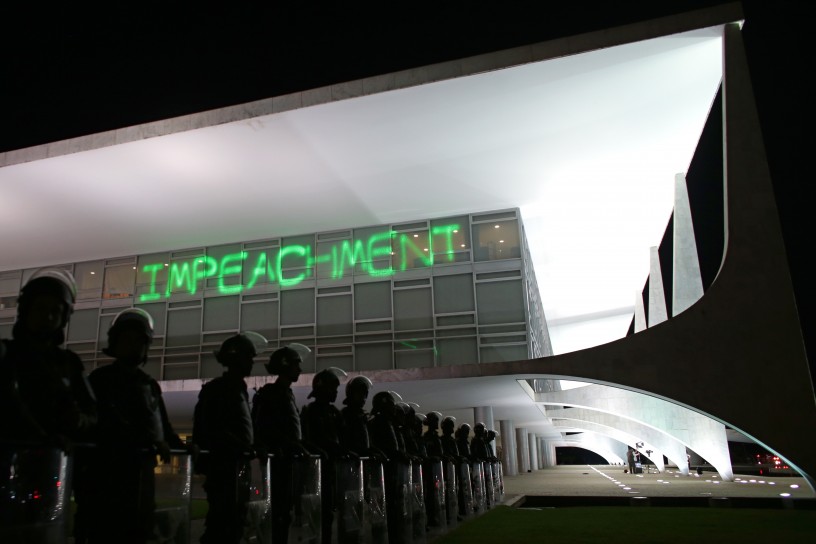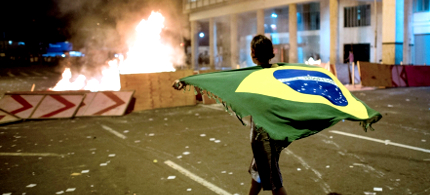Brazil’s Presidential Crisis: What’s Happening and Why You Should Care
BRICS, 28 Mar 2016
Bryan Dewan, ThinkProgress – TRANSCEND Media Service

Brazil’s President Dilma Rousseff walks after a visit to ground infrastructure works for the 2016 Olympic Games, in Brasilia, Brazil.
CREDIT: AP Photo/Eraldo Peres
25 Mar 2016 – While scrolling through your Facebook feed or preferred news app of choice this week, you’ve probably seen headlines calling attention to Brazil’s embattled president, Dilma Rousseff. The political crisis, which has been worsening for nearly a year, will have lasting political and economic ramifications for the world’s sixth-largest nation, and it should be a cause for much greater international concern.
If you’re interested in Brazil’s presidential fiasco, but are still a bit unsure about what exactly is going on, we have you covered.
Here’s a quick breakdown of Brazil’s presidential fiasco, so that you can be better informed about this emerging Latin American political crisis:
What’s happening?
This week, Dilma Rousseff is facing renewed calls from Brazilians and international observers to resign from office. About 68 percent of her constituents want her impeached. But despite these calls for resignation, Rousseff has doubled down on her commitment to stay in power, saying she “will never resign” from her office.
Rousseff’s presidential troubles began in early 2015, when allegations surfaced that Rousseff had participated in political graft and bribery while she was on the board of the Brazilian state-supported energy company, Petrobras. A year earlier, federal officials began investigating Petrobras and Workers’ Party officials for suspected corruption in the Petrobras contracting process. What investigators found is perhaps the largest money laundering and political corruption scandal in recent history.
Over the last decade, contractors, oil executives, and government officials allegedly conspired to award massively inflated and lucrative contracts to construction companies working for Petrobras. The contractors who were awarded these lucrative bids allegedly lined the pockets of the same Petrobras executives who helped them out. Because Petrobras is owned by the Brazilian government, the corruption eventually managed to flow all the way up to the highest levels of the political establishment. On March 16, 2015, prosecutors began their pursuit of justice by charging 27 people in connection to the scandal, most of whom were high-ranking political leaders of Rousseff’s Workers’ Party. In total, 86 people have been convicted so far, most of them well-connected political figures and businessmen.
When news broke of Rousseff’s potential involvement as a member of the Petrobras board, the Brazilian populace erupted in protest. Throughout 2015, several protests against Rousseff’s government drew thousands, even millions in some instances, to the streets. These massive demonstrations have continued into 2016, and Rousseff’s approval ratings are plummeting.
Last Thursday [17 Mar], Rousseff created more waves by naming former Brazilian president Luiz Inácio Lula da Silva as her Chief of Staff. Commonly referred to as “Lula,” the former president, now 70, is being investigated for his role in the Petrobras scandal, and many believe Rousseff’s move is to protect him from legal actions, since the position comes with some legal protections. A judge moved to block this appointment, but his future is being tossed around in the nation’s highest courts.
Meanwhile, Rousseff has also presided over one of the worst recessions in Brazil’s history. Economists estimated that Brazil’s economy shrunk by 3.8% last year, and forecasts for this year are equally as depressing.
Who are the key players?
Dilma Rousseff
Dilma Rousseff is the current president of Brazil, serving since January 1, 2011. In her earlier years, she was involved in several left-wing guerilla organizations resisting the Brazilian military dictatorship, and was eventually captured, imprisoned, and allegedly tortured. After her release in 1972, Rousseff and her partner, Carlos Araújo, were instrumental in founding the Democratic Labor Party (PDT). Rousseff held a number of government positions as a member of the PDT before joining the Workers’ Party in 2000, after a significant dispute with PDT leaders. In 2005, she was named Chief of Staff to then-president Luiz Inácio Lula da Silva, and was subsequently elected president herself in 2010. In 2014, Rousseff stood for re-election and received 51% of the popular vote, in one of the closest elections in modern Brazilian history.

Soldiers stand guard outside Planalto presidential palace where protesters have projected the word “Impeachment” on the building, as they call for the impeachment of Brazil’s President Dilma Rousseff in Brasilia, Brazil, Monday, March 21, 2016.
CREDIT: AP Photo/Eraldo Peres
Luiz Inácio Lula da Silva
Luiz Inácio Lula da Silva, commonly referred to by his nickname “Lula,” is Brazil’s former president. A former metalworker and union operative, Lula helped found the Workers’ Party in 1980. After unsuccessfully running for president three times, Lula was elected Brazil’s president on October 27, 2002. He successfully ran for a second four-year term in 2006. On January 1, 2011, he left office and handed over the presidency to his longtime friend and political ally, Dilma Rousseff. Lula was well-known for having been one of the most popular politicians in the world during his tenure as Brazil’s president. When Lula left office in 2011, he had a 90% approval rating, virtually unheard of in democratic societies. Lula, whose home was raided by authorities earlier this month, is now under investigation for his connection to the Petrobras scandal. Many believe that Rousseff’s attempt to appoint him as Chief of Staff is meant to shield him from legal investigations.
The Workers’ Party
Following its founding in 1980, the Workers’ Party (Partido dos Trabalhadores, in Portuguese) has emerged to become the dominant left-of-center voice in Brazilian politics. Under Luiz Inácio Lula da Silva and Dilma Rousseff, the party has controlled the Brazilian presidency since 2002. The party has been implicated in several controversies, including the Mensalão corruption scandal that resulted in the resignation of the party’s president, José Genoíno, who is now under house arrest. The Workers’ Party allegedly played a significant role in the Petrobras scandal, but Rousseff will need its support in order to stay in power.
Petrobras
Petrobras is Brazil’s state-supported energy company. Founded in 1953 by Brazilian president Getúlio Vargas, Petrobras was the sole Brazilian oil operation for over 40 years, until a constitutional amendment broke the company’s legal monopoly in 1997. Petrobras remains one of the largest oil companies in the world, even after its profits have plummeted in connection with the corruption scandal.
Why should you care?
Brazil’s economy is the eighth largest in the world, by GDP purchasing power parity. A political crisis in Brazil will no doubt have implications on the nation’s economic confidence, further exacerbating the deeping Brazilian recession that threatens the global economy. The Eurasia Group listed Brazil’s political crisis as one of the Top 10 risks facing the globe in 2016, citing the long-term international economic implications of a Brazilian governance failure.
While it’s important to consider how the presidential crisis affect the rest of the world, it’s also imperative to highlight the effects on ordinary Brazilians. In a nation prone to high levels of income inequality, sprawling favelas, and rising unemployment, this massive corruption and political crisis is leaving Brazilians uncertain and disheartened about their economic future. Before the recession, Brazil’s economy had become a regional model for economic growth. Now, some economists are predicting that the current recession will become the worst Brazilian economic event since 1901. A New York Times report from last August highlighted how the Petrobras scandal made the dream of a prosperous future seem more like an illusion to many Brazilians.
Additionally, Rio de Janeiro, Brazil’s second largest city, is set to host the 2016 Olympic Games in August. The games were marketed to the International Olympic Committee as a chance to bring the Olympics to South America and showcase Brazil’s advancements to the world, but now this message seems tarnished by the political firestorm surrounding Rousseff. Furthermore, some of the Olympic construction projects are believed to have been awarded under questionable circumstances. These allegations are currently being investigated. With the Rio Olympics consistently running into problems, the lack of a unifying leader will likely leave the nation adrift and unsettled as it heads into the summer.
Go to Original – thinkprogress.org
DISCLAIMER: The statements, views and opinions expressed in pieces republished here are solely those of the authors and do not necessarily represent those of TMS. In accordance with title 17 U.S.C. section 107, this material is distributed without profit to those who have expressed a prior interest in receiving the included information for research and educational purposes. TMS has no affiliation whatsoever with the originator of this article nor is TMS endorsed or sponsored by the originator. “GO TO ORIGINAL” links are provided as a convenience to our readers and allow for verification of authenticity. However, as originating pages are often updated by their originating host sites, the versions posted may not match the versions our readers view when clicking the “GO TO ORIGINAL” links. This site contains copyrighted material the use of which has not always been specifically authorized by the copyright owner. We are making such material available in our efforts to advance understanding of environmental, political, human rights, economic, democracy, scientific, and social justice issues, etc. We believe this constitutes a ‘fair use’ of any such copyrighted material as provided for in section 107 of the US Copyright Law. In accordance with Title 17 U.S.C. Section 107, the material on this site is distributed without profit to those who have expressed a prior interest in receiving the included information for research and educational purposes. For more information go to: http://www.law.cornell.edu/uscode/17/107.shtml. If you wish to use copyrighted material from this site for purposes of your own that go beyond ‘fair use’, you must obtain permission from the copyright owner.

This is a very one-sided collection of facts and omits the question whether the Brazilian President can actually be impeached on political reasons (which is why some call it an attempted coup), since there is no evidence that President Rousseff is involved in any illegal activity. Furthermore, it omits the fact that the opposition parties have a similar or maybe even bigger corruption problem as the Workers’ Party. The Speaker of the House and the Vice President are both being investigated unlike the President.